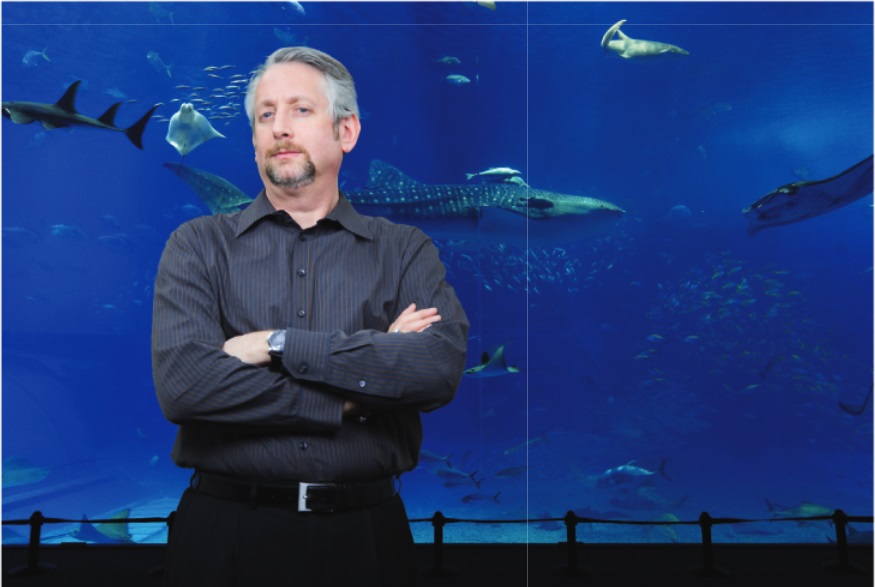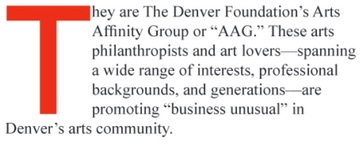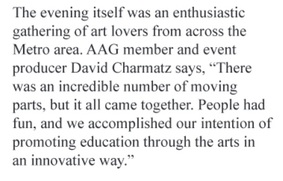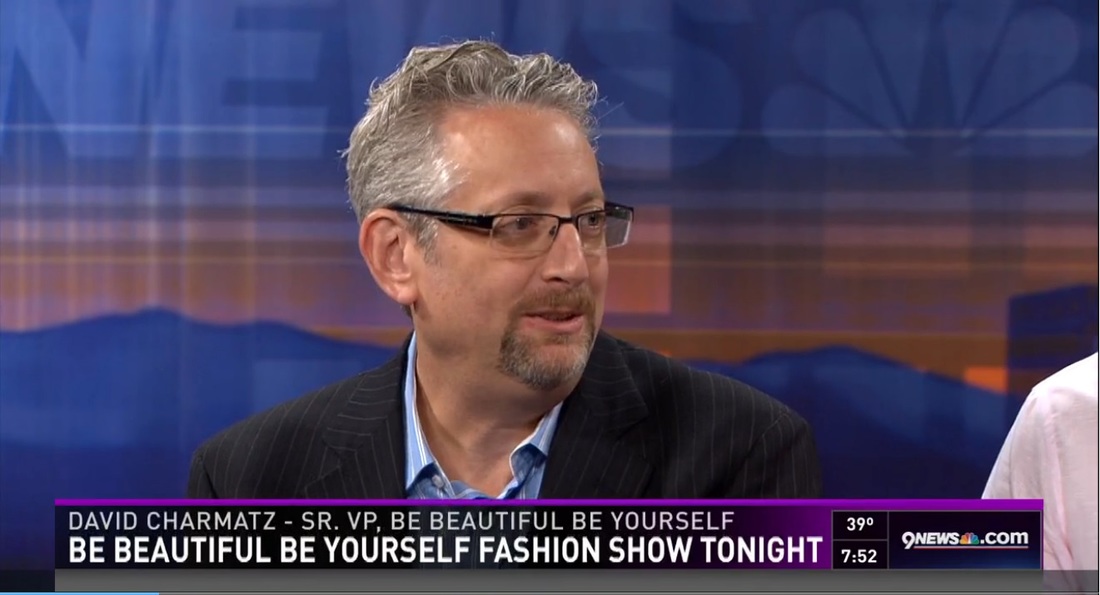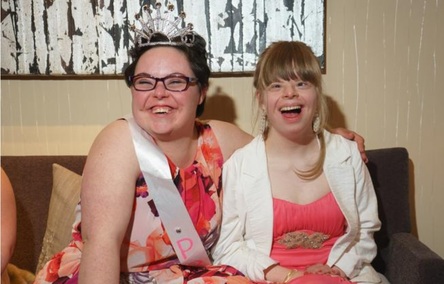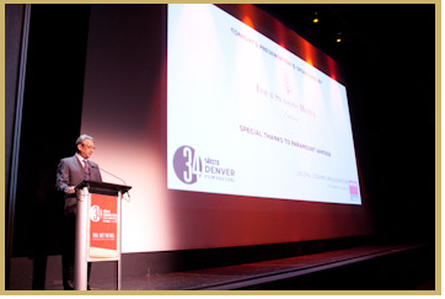Press
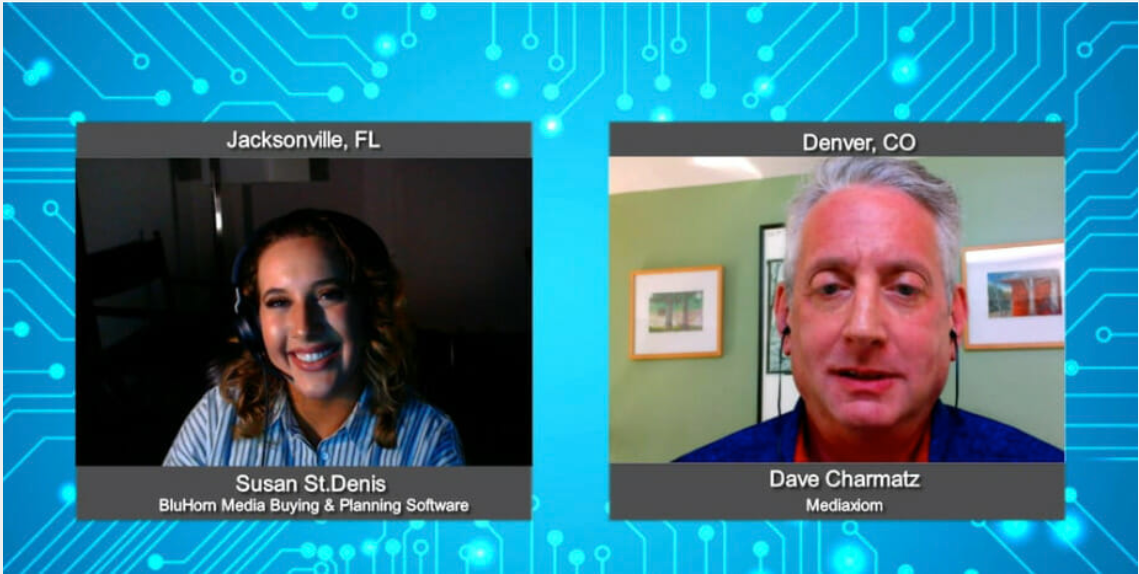
“Media Champions” with Dave Charmatz from Mediaxiom
On “Media Champions,” our host speaks with experts within the media community. This week Susan St.Denis speaks with Dave Charmatz from Mediaxiom. --March 18, 2021 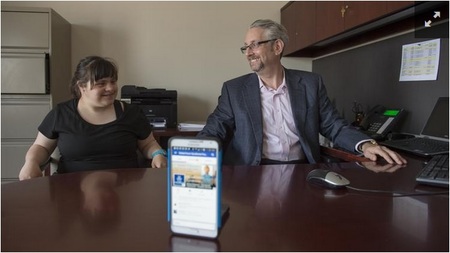
Denver Business Journal
Global Down Syndrome Foundation: 'Lightning in a Bottle' By Caitlin Hendee, Digital Producer / Social Engagement Manager The Global Down Syndrome Foundation, a nonprofit advocating for research, medical care and education around Down syndrome, knows first-hand how important it is to make the most of every moment on social and capitalize on it. When the organization posted a photo on Facebook of a little boy named Ari wearing a shirt that said, “I love homies with extra chromies,” it quickly became very popular, garnering 40,000 views in just two hours. Seizing the opportunity, the social media management consulting firm Wide Focus, which was advising the foundation, boosted it. “By 36 hours it had over 1.5 million views. It got a ton of shares and likes, over 80,000 likes. It was lightning in a bottle,” Charmatz said. Recognizing when to take advantage of an opportunity is one of the most important strategies the foundation applies in its social media plan. “We do try to tell the best stories that are happening not just domestically, but around the world, for people with Down syndrome, to tell their stories. … And we want to call attention to the negative, too, make sure people can have a voice and platform to talk about it.” That involves a lot of content curation that is posted to the group’s social media channels, Charmatz said, a strategy that has paid off in dividends. “Since we’ve started adding in this other dimension, we’ve raised our Klout score by 20 points,” he said. “There’s a lot of great things happening in our community and we want to try and magnify on that.” At Home on Stage, Colorado Arts Groups Make Pitches to 'Shark' Donors
By Stephanie Wolf Taking a lead from the hit ABC television series, six Denver-based arts organizations pitched to a team of metro arts professionals and a live audience of invited guests Wednesday night in a bid to secure funding for their projects from a $65,000 pool up for grabs... Unconventional grant-making Head of AAG, David Charmatz, said the philanthropic group initially funded cultural projects through traditional means after its inception in 2013. More recently, AAG began looking to the worlds of entrepreneurship, venture capitalism and reality television to find less conventional ways to grant awards. “We wanted to show that we were willing to be innovative because we expect our applicants to be innovative,” Charmatz said. Beyond the financial rewards The “Shark Tank”-like public event can seem a bit gimmicky, but Charmatz said the format engages the community, making giving to the arts more public. “People feel more a part of the process,” Charmatz said. “Even if they couldn’t be in the front end they can be in the back end.” Be Beautiful Be Yourself Fashion Show
KUSA - Each year, the Be Beautiful, Be Yourself Fashion Show attracts more than 1,200 guests. It's the largest fundraiser for people with Down Syndrome in the U.S., having raised more than $9.5 million for research, care and education about the condition. It's happening Saturday night at the Colorado Convention Center. Joining 9NEWS Saturday morning to talk more about the fundraiser are Senior Vice President David Charmatz and Denver Broncos kicker, Brandon McManus. McManus and Charmatz said it's an important evening where people with Downs Syndrome show the world what they can do. The fashion show is the highlight of the evening, where adults and kids with the condition walk the runway to show their beauty. bebeautifulbeyourself.org Ostrow: Why wait? Movies, TV shows are now available early and everywhere
By Joanne Ostrow, Denver Post Television Criticdenverpost.com ... Getting folks to pay actual dollars for online content remains tricky. "Someone ultimately has to make money. If the numbers don't work it's harder to spend $5 million on a network drama," said Mediaxiom's David Charmatz, a Denver-based consultant and industry veteran. The numbers tell the story, according to Charmatz, a veteran of Starz, MTV and A&E. Television is a business of tens of billions of dollars based on advertising revenue. The money made from Netflix, Hulu, iTunes and the rest, he said, is "gravy." Mess with the traditional marketplace, and you jeopardize the whole ecosystem of ad-based TV. There's an odd "sociological piece" in consumer behavior: Charmatz marvels at the way people are willing to buy apps that make something more convenient or that are just cool, "but the same people will not spend a penny to buy content. ... They won't buy a TV show; they won't buy a song. Right now, there is a whole group of people — millions of potentially billions of people — who don't see the value proposition in buying content." ... Davidson: Global Down Syndrome Foundation hosts its fourth Hollywood "Gold and Glam" is the theme for dinner-dance
By Joanne Davidson The Denver Post This was the fourth year for the Hollywood Ball, and the "Gold and Glam" theme was carried out in both the décor in the Cottonwood Ballroom at the Four Seasons Hotel Denver and in the evening gowns worn by many of the female guests. David Charmatz, the Global Down Syndrome Foundation's senior vice president for strategic growth and development, and his wife, Jody, were there to party alongside a crowd that also included Matt Wilson with his sister, Megan, and her friend, Jordan Harmon; Hillary MacAdam; Nora Gift; Beth Pasterkamp; Abigail Frary; and event coordinator Tobie Orr. 
"Cinema & The World 2013"
International Business Circle April, 11, 2013 Charmatz discusses the domestic and international movie business and trends in the media industry. |
2015 Down Syndrome Awareness Month
Hosted by Joy Keys Special Guest: David Charmatz, SVP of the Global Down Syndrome Foundation.Charmatz oversees marketing, public relations, research and analysis for Global, and his top priorities will be growing the personnel and revenue in order to better serve the needs of people with Down syndrome nationally and internationally. Before joining Global full-time, Charmatz was a consultant assisting with the launch of Down Syndrome World magazine and Global’s monthly electronic newsletter, and with the planning of a second edition of the Down Syndrome Prenatal Testing Pamphlet. The Global Down Syndrome Foundation is a public non-profit 501(c)(3) dedicated to significantly improving the lives of people with Down syndrome through Research, Medical Care, Education and Advocacy. www.globaldownsyndrome.org 
Teen Model With Down Syndrome Wows Crowd With Fierce Runway Walk
By Elisabeth Brentano Gigi Cunningham is an aspiring model and actress with Down syndrome, and since we last checked in with her, she’s made huge strides towards achieving her dream of working in the entertainment industry. Her latest accomplishment? Wowing the crowd at the biggest Down syndrome fundraiser in the country... “Gigi really rocked the runway with model Amanda Booth during the show and we are proud of all the models who participated,” David Charmatz, Senior Vice President, Global Down Syndrome Foundation, said in a statement to The Mighty. The 7th annual “Be Beautiful Be Yourself” fundraiser benefited the Linda Crnic Institute for Down Syndrome and the Sie Center for Down Syndrome at Children’s Hospital Colorado. Celebs who walked the runway included actress Jamie Brewer, Minka Kelly, Beau Bridges, John C. McGinley, Beverly Johnson and Terence Howard. GDSF told The Mighty the show raised close to $2 million. Online Viewers Just as Likely to Watch on TV Set, Study Says
TelevisonWeek By Daisy Whitney People who watch movies and television shows online and on alternative devices are just as likely to also watch programming on the television set. That’s the finding from a study conducted this fall by premium cable network Starz and shared with TelevisionWeek. The online survey of 5,500 individuals 12 and older found hat about 18% of that group watched TV shows and movies online, on broadband-connected gaming consoles such as the Xbox, or on cell phones. Of this group, 77% also watch live television on the8 TV set itself, compared to 75% of the general population who do so. “The sky is not falling,” said David Charmatz, senior VP of product planning and development at Starz. “TV viewing online is additive. It’s not a net down.” 
Video Distribution and Mobile Apps: Telecom Trends and Changes
The Carmel Group By: Jimmy Schaeffler Indeed, currently some young, restless, and creative software applications developer is honing in now on an application that will jump start the actual alliance between video content and what I will, for today and this column, call Enhanced Mobile Entertainment. EME is an actual hybrid of the two somewhat similar terms, Locations Based Services and Geographical Information Systems, both of which deal with this rather complex and arcane industry subsector involving informational mapping. The term and acronym “EME” is the brainchild of Starz Encore senior vice president David Charmatz. Knowledge Networks Interview TV and Online Video – Finding an "Over-the-Top" Business Model KN Talks to Mediaxiom's David Charmatz – planning and research veteran from Starz, MTV, A&E Do you see a viable business model for your clients in "over the top" TV? Yes, but you've got to put it within the right context. It is a video business that's still buoyed by the advertising market; if the advertising market cannot support it, then it can't be supported as a business. If it winds up being a huge detriment to the existing traditional businesses, without enough gain to cover the difference, it jeopardizes the whole infrastructure. All those other models – transactional, subscription, and any hybrids thereof – cannot survive without an ad-supported model as a base. Is that your opinion, or is that a fact? No, that is a fact. It's a simple mathematical equation. ... if you're going to take 10 or 20 billion dollars out of that marketplace, and you can't replace it somewhere else, then it jeopardizes the whole ecosystem of delivering messages and delivering value that can sell products. What do you think about the research going on in this space? I think most of it is crap... People tend to run after shiny objects – that's what it comes down to. This forces other researchers – some of whom are very good – to react, because their management does not have the right tools to say that these numbers don't make any sense. It's not even improbable – it's impossible. Have you encountered cases in which your clients or colleagues have regretted going with cheaper research? All the time. If you are going to cut the research budget, or flatten it, but increase the demand, it forces people to make compromises. If you're a good researcher, you do the best you can to try to minimize those tradeoffs – but they're still tradeoffs. I've seen people make business decisions based on really poor information, and it winds up being wrong. There's no guarantee that any research is 100% right; but it can minimize risk. That is what good research does for you. What do you see as the future for DVDs? Our report still showed very strong usage, but it is clearly a medium in jeopardy. People are not going to spend a lot of money on the technology right now. Consumers have to get used to the electronic piece, the fear of "breakage" of electronic files versus hard goods. And content providers have to let go of incrementalization, the practice of trying to get another dollar out of people for a slightly different version of the same product they've bought 16 times before. Platforms like Disney's KeyChest can help consumers overcome their trepidation toward purchasing new homevideo products. What about use of mobile video? What do you think is the potential opportunity there? You've got to put mobile video into buckets, because it's not one thing. It is a whole series of things, and, depending on the client, you've got to figure which of those platforms make the most sense for your product and your brand. There's broadband streaming video, broadcast video – such as the networks' digital sideband channels – and video you download to a mobile device for later viewing. Do you think the behaviors of TV versus Internet use will meld, or do you think they will always be clearly distinct experiences? The answer depends on where you live. [laughs] For that to be a one to one relationship in this country, it's going to take a long time. If you go to parts of the world where they're building an IP all-digital platform infrastructure, the question of Internet/TV difference is basically moot – because the bits are the bits, and you can do anything you want on the same screen using the same type of device. If you have IP infrastructure and a really smart set top box, it's easy enough for you to make phone calls and go on the Internet and watch TV through any device. It just comes down to a convenience discussion. So what would you say is your core message to media clients right now, as they try to straddle the new and traditional platforms? Ultimately, the discussion is about the value proposition – that is what companies mostly forget. What is the value to the consumer to do anything? What is the value to the consumer to buy a product or service when they can get it for free and they have little risk if they pirate it? This is the other reason why I say the ad-supported model is the only way you can support content – because if you do not have that revenue, then the quality has to start to decline. Then the only high-quality content is going to be in a movie theater or some version thereof – because TV cannot continue to spend three to five million dollars an hour to produce this content when content life is shrinking. You don't have the same horizon to pay back your investment. So you need to monetize faster. Starz Denver Film Festival 2011 Opening Night: Like Crazy works like crazy
Denver Westword By Michael Roberts, Thu., Nov. 3 2011 Just after 8 p.m., the lights dimmed and Denver Film Society board chairman David Charmatz -- once Starz's Senior Vice President of Product Planning and Development, now an independent media consultant -- took to the podium. He's a dynamic speaker, striking just the right mix of movie love and boosterism. He noted that the fest is considered one of the fifty best on the planet (by indieWIRE) and pointed out that more than 270 pictures will unspool in the coming days, making this year's model the most ambitious ever, at least from a volume perspective. |
Branding / Marketing / Turnarounds
Product Development / Production / Programming
Business Intelligence / Research
Market Analysis and Development / Promotions / Packaging
© Mediaxiom LLC 2010-2024
Product Development / Production / Programming
Business Intelligence / Research
Market Analysis and Development / Promotions / Packaging
© Mediaxiom LLC 2010-2024

